
On 5 November 2018, Turkish Policy Quarterly (TPQ) held a roundtable discussion titled “Combating Disinformation and the Cyber Threat,” which was supported by NATO’s Public Diplomacy Division. The Friedrich Naumann Foundation and the Israeli Consulate in Istanbul were our partners. The conversation revolved around the proliferation of digital information, its toxicity for democracies, and the challenges facing policymakers in identifying and mitigating disinformation campaigns. The U.S. Consul General in Istanbul, Jennifer Davis, provided opening remarks after which the panel discussed a range of issues including trends in robotrolling, the security vs. privacy debate, the steps Israel is taking in combating the proliferation of fake news, and NATO-wide efforts to combat disinformation.
The panel featured:
Opening Remarks:
- Jennifer L. Davis, US Consul General in Istanbul
Moderator:
- Matthew J. Bryza, Member of the Board of Directors, Turcas Petrol; Senior Fellow, Dinu Patriciu Center of the Atlantic Council; CEO, Lamor Turkey; Member of the Advisory Board, Turkish Policy Quarterly.
Speakers:
- Darija Bräuniger, Deputy Chairwoman, LOAD e.V (Association for Digital Liberal Policy), Germany
- Rolf Fredheim, Principal Scientist, Technical and Scientific Development Branch, NATO Strategic Communications Center of Excellence, Latvia
- Robert Pszczel (via live-stream), Senior Officer for Russia and the Western Balkans, Public Diplomacy Division, NATO HQ
- Ram Levi, Founder and CEO, Konfidas Digital Ltd., Israel
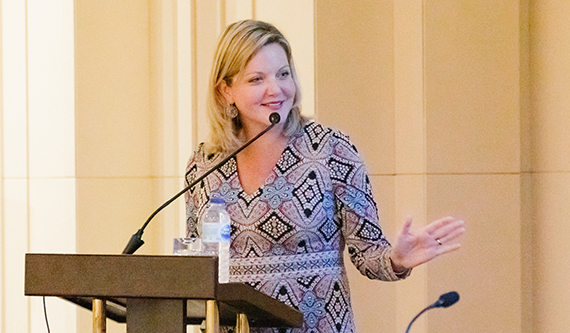
In her opening remarks, US Consul General in Istanbul, Jennifer Davis, emphasized that disinformation poses an existential threat to democracies, and that it is incumbent on governments, the media, and individuals to work together to combat the rampant spread of disinformation. Chief among the concerns is that by playing to the emotions, fears, and prejudices of people, disinformation is eroding the civic infrastructure of our democracies. Particularly, against the backdrop of an upsurge in nationalism, populism, and xenophobia across the globe, online disinformation poses an even greater risk. Addressing how democratic governments can respond, Consul General Davis stressed the importance of supporting the free and independent media stating, “government interference in the media is a death knell to democracy.” She also touted the role of the journalist in today’s political landscape, arguing that we need more journalists now more than ever. Finally, on an individual level, diversifying the outlets and opinions we are exposed to is necessary, stated the Consul General, as it makes us more informed consumers of information.
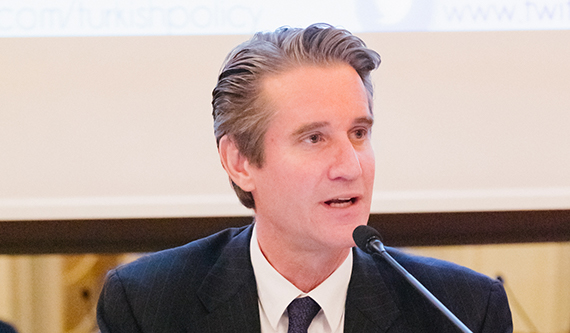
Our moderator, Matthew Bryza, Member of the Advisory Board of Turkish Policy Quarterly, framed the discussion by talking about how the conversation on cyber has changed dramatically even in the last five years. He spoke of how only a few years ago the conversation around cybersecurity revolved around protecting individuals from organizations and governments seeking to breach the right to private security. However, now, what is more concerning is the protection of democracy and democratic institutions from individuals seeking to do harm through their ability to manipulate information. Bryza also drew attention to the fact that in the United States, fake news has in fact increased since the 2016 election and despite the fact social media outlets like Facebook have initiated efforts to police their sites for content. Furthermore, Bryza cited an Oxford Internet Institute report which found that more of the problematic content appears to originate from the US, more so than from Russia, Iran, Venezuela, or other foreign powers. This reality poses profound challenges for the US, as well as other liberal democracies, in grappling with home-grown fake news, hate speech, and extremist views, opined Bryza.
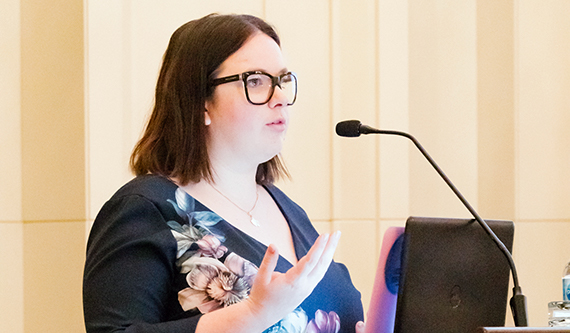
Our first speaker, Darija Bräuniger, Deputy Chairwoman of LOAD e.V. (Association for Digital Liberal Policy), began her talk by addressing the difficult relationship between combating fake news and false narratives on the one hand side and the right to freedom of expression on the other side. Bräuniger stressed that whenever we talk about disinformation, we must remember we are always talking about fundamental rights, and that finding liberal solutions to combating disinformation is important. To illustrate this point, she elaborated on a recently passed German law, the Network Enforcement Act, which aims at combating fake news by holding social networks accountable for the content they host. For example, if a post on a social media platform is considered hate speech, defamation, or fake news and is not removed within 24 hours of being reported, social networks can face huge fines. This caused an uproar among German society as many argued that this law infringed upon free speech. Additionally, Bräuniger informed the audience as to what the EU has been doing in terms of fighting disinformation. She drew attention to the fact that the EU Commission proposed an EU-wide code of practice in May which improves transparency for companies, promotes diversity of information, fosters credibility of information, and fashions inclusive solutions.
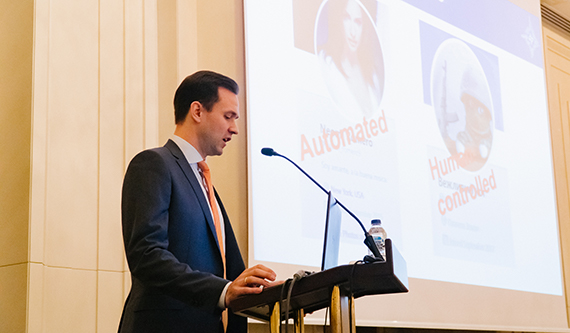
Dr. Rolf Fredheim, Principal Scientist of the Technical and Scientific Development Branch, of NATO Strategic Communications Centre of Excellence in Riga (STRATCOM COE), provided an overview of "robotrolling," i.e. the coordinated use of fake accounts on social media, and the steps that the Centre in Riga is taking to combat it. Fredheim explained to the audience that there are two kinds of bots on social media-automated and fake human controlled accounts (also known as sockpuppets)—and that paradoxically, it is the automated accounts which feature visuals of real people whereas the human-controlled accounts are more likely to be anonymous. Today, there is a trend from automated to anonymous, where accounts that are operated manually and/or can fool human observers are dominating the conversation. Fredheim explained that the Riga Centre’s response to bot armies and digital manipulation is the development of algorithms which estimate how much social media activity is authentic. According to the Riga Centre’s findings, the volume of fake activity in the Russian language is around 50 percent, and sometimes as high as 80 percent, pointed out Rolf. Furthermore, the purpose of Russian troll activity is aimed at sowing division in English-speaking populations. Fredheim concludes with stressing that “if you can’t measure it you can’t manage it,” rendering part of the solution to protecting the global digital ecosystem from disinformation actually measuring the amount of fake internet activity.
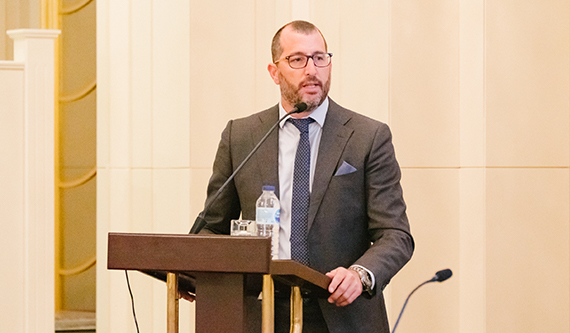
Ram Levi, Founder and CEO of Konfidas Digital Ltd. based in Israel, echoed the other speakers in asserting that while protecting critical infrastructure from cyber attacks is now something we have become adept at, protecting from disinformation poses a more daunting challenge. This effort will require new technologies, new experts, increased funding, and regulation. Levi underscored that the biggest threat to our democracies today are the efforts to undermine the credibility of the election process and the information we as human beings consume. He highlighted a couple of examples: the 2015 elections in Israel which involved misinformation and fearmongering to drive the right-wing people to go out and vote; the recent Brazil elections which involved an erroneous message on Facebook about the date of the election; and Russian meddling in the 2016 US election. He underlined how difficult it is to fight the global proliferation of fake news because people are consuming information that validates their beliefs as opposed to questioning the source of their news. The fact that the Oxford Dictionary picked “post-truth” as its 2016 word of the year is reflective of this trend, stated Levi. From an Israeli perspective, there is a lot being done to counter disinformation, stated Levi. One such initiative is the National Cyber Directorate of Israel’s manual which is intended to raise awareness about disinformation among politicians and political parties, as well as to guide them on risk-mitigating measures. The Directorate is also working with social media platforms to take down fake news. Levi informed the audience that Israel is working on a non-governmental level as well—with groups of activists that are looking for twitter bots. All of these efforts underscore how Israel is taking the issue of optimizing credibility in our digital world seriously, concluded Levi.
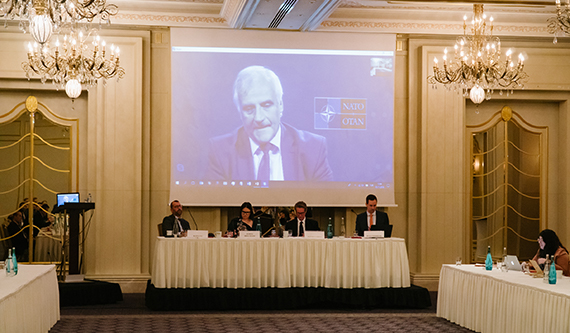
Robert Pszczel, Senior Officer for Russia and the Western Balkans of NATO’s Public Diplomacy, joined the discussion via live stream from Brussels to talk about NATO’s efforts in countering disinformation, which he contextualized as being one of the many strands in the broader framework of hybrid challenges. Pszczel drew attention to a key decision taken by the allies at the Brussels Summit in July: A hybrid attack, which includes a cyber attack, can trigger an Article 5 response. Furthermore, the rising importance of cyber has rendered it one of NATO’s operational domains, stated Pszczel, which carries significant implications for the way NATO conducts its operations. The complex picture of cyber threats—especially when state-orchestrated—makes it difficult to design a successful response, and the very fact that the Alliance operates according to rules and principles puts it at a disadvantage in combating disinformation, commented Pszczel. However, NATO has also taken important strides in several areas including enhanced situational awareness about the nature of the threats posed, and stronger information-sharing initiatives with allies and partners. Additionally, a key outcome of the Brussels Summit in July 2018 was to implement counter-hybrid support teams which provide targeted assistance to Allies in preparing for and responding to hybrid activities. Pszczel also stressed the importance of Centres of Excellence (CoEs) that enhance the interoperability of the alliance and offer expert data analysis. As accurate and rigorous fact-checking is key, albeit expensive, to curb the negative impact of disinformation campaigns, CoEs successfully assist NATO in allocating its resources and capabilities for the resilience of the alliance in cyberspace, Pszczel argued. In conclusion, Pszczel underscored that part of the solution to countering disinformation lies in openness and highlighted the importance of inviting journalists—including those from countries that propagate disinformation—to ministerial meetings.
The Q&A session allowed for some further exploration of the general themes discussed by the panelists. Participants raised questions on the capabilities of nation states in dealing with cyber threats, on the possibility of combatting disinformation via interstate initiatives, and on the extent of cooperation between NATO and Turkey regarding the hybrid threats posed to members of the alliance. |
